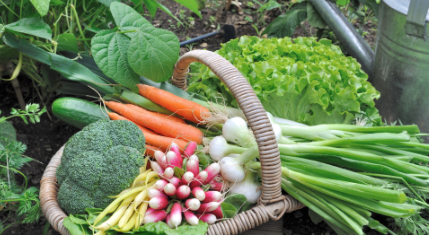Knowledge of Ayurvedic principles helps us restore balance to our bodies, minds, hearts, and the Earth. It works with the laws of nature to help us better understand our place in the world and relationship to it. It offers us wisdom that supports our ever-changing sense of self and physical body. It asks us to eat seasonally, which means eating foods that are grown locally from season to season, and also knowing which foods to eat that aren’t grown locally but still have immense benefit to the body if we can access them (which for the most part here in the US, we can).
Ayurveda also tells us that we can’t ever isolate a problem or a solution; that everything in life works together. So when it comes to what foods to eat and when, we’ve got to get out of the habit of our western way of thinking, which often tells us to avoid certain ingredients at the expense of others, and to over-indulge in whatever the latest health trendy superfood might be. Anytime we isolate something out or add it in to the extreme we put the body at risk, according to Ayurveda. We need protein, carbohydrates, vitamins, minerals, fat, and sugar in our diet to be balanced. They all correspond with different functions, and without even just one of them, our body has to compensate and overtime this can lead to health risks.
“One key reason the fad diets of the past century have been so unsuccessful and even harmful is that they insist on restricting one form of food for another. The problem with restricting basic kinds of nutrients from the diet is that our bodies are programmed to make use of them all. Proteins, carbohydrates, fats, and sugars serve a distinct purpose, and trying to do without one group for the mere expedient of losing weight is just another example of paddling against the current.” For example: “protein is our main enzyme and hormone source, and we need to get enough of it to feel strong and vital, as well as, for our musculoskeletal system to function properly”—if we’re not getting enough, our muscles, nerves, emotions, maintenance of all tissues and quality of our blood can all suffer. (That said, what constitutes enough is different from person to person, and dosha to dosha).
We also need to eat enough good fats in our diet because fat is also an essential factor in hormone production, and because fat “is our most reliable source of fuel.” It’s slow burning and has provided sustenance for humanity since the beginning of our time here on Earth. “Fat contributes to vital cell processes, and helps carry fat-soluble vitamins (A, D, E, K, and certain minerals) to tissues and organs, and helps to lubricate the joins, hair, skin, and nails. The triglycerides in fat hold our intestinal organs in position, and insulate our bodies against the cold.” The right amount of fat also helps our gastric secretions to produce and distribute properly, and it binds to flavor—so even just a dash of fat (like olive oil) can make something taste extra delicious!
Knowing how much of which ingredients is right for your body is a patient process. It’s a lot of paying attention to how certain foods make you feel, and working with a practitioner one-on-one to test for food allergies and look at blood reports to determine where you need support. So this article is intended to bring a basic, general understanding of what kinds of things we can be thinking about when it comes to nourishment this winter.
Right now it’s winter in the Northern Hemisphere, and if we don’t eat enough warm foods with some protein and some fats this season, we might be setting our bodies up to be susceptible to more cold and flu symptoms in the spring. That’s because, according to Ayurveda: “a each seasonal harvest antidotes the harsh characteristics of that season. The seasonal harvest also prepares the body for the coming season…and warming, high-protein, and high-fat winter foods help to balance the cold/dry extremes [of the season] and lubricate the mucous lining of the intestines, lungs, and sinuses. With higher consumption of soluble fiber from winter grains and seeds, like chia and flaxseeds, the intestinal environment slowly becomes coated with a nutrient-rich layer of soluble fibrous slime. This prepares the intestinal lining to welcome in a brand new stable of beneficial spring microbes.”
So right now in the midst of winter, we’re encouraged to eat extra warming foods (cooked vegetables, soups, stews, rice and beans) and to add in some extra protein and fat to keep us strong, moist, and in balance to prepare for spring. Our recommendations are: add ghee into your diet (if you’re not vegan), stick to warm foods instead of cold or raw foods, take in a little extra protein with lunch (tofu, nuts and seeds, beans and rice, free-range/organic meats and wild caught fish), be mindful to eat foods that are grown locally during this time (carrots, beets, brussels sprouts, garlic, avocados, squash, sweet potatoes, etc.), and stay hydrated with warm water or tea throughout the day. If you want some specific nutritional guidelines that can help you in a more specific way, please set up a consultation with us! Ayurveda is a form of medicine with practices and recommendations that vary person to person. So this article is just a small, generalized window into what kinds of things we can be thinking about when it comes to nourishment this winter.
To schedule a consultation at 30% off (for your first one) with us and learn more about your own constitution and needs, click here: https://santacruzayurveda.com/appointments/
Sources and Quotes
Quotes are from John Douillard, an Ayurvedic and Chiropractic practitioner
“The 3-Season Diet,” John Douillard
